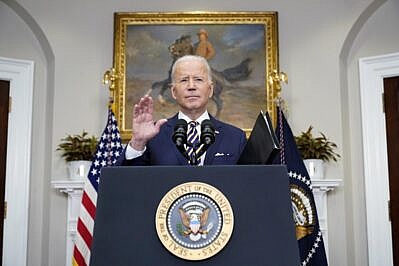President Joe Biden announced a ban on Russian oil imports Tuesday.
Summary
President Joe Biden announced a ban on Russian oil imports Tuesday. The move represents a sharp escalation in US sanctions and will cause gas prices to further rise.
- Biden acknowledged this would hurt Americans too, saying, “Defending freedom is going to cost.”
- The US imports roughly 8 percent of its oil and petroleum products from Russia, the world’s second-largest crude oil exporter after Saudi Arabia.
- The United Kingdom also announced plans to phase out Russian oil imports by the end of the year.
- The European Union, much more dependent on Russian oil and gas than the US or UK, plans to slash its dependence by two-thirds in 2022 and wean itself of Russian energy over the next few years.
![]()
- The Washington Post covered Democrats’ “politically risky strategy on rising gas prices:” embrace a policy guaranteed to raise gas prices while pinning the blame on Putin.
- The Daily podcast from The New York Times asked, “will banning Russian oil hurt Russia, or the US?” as they tried to evaluate the US’s “most dramatic step yet to punish” Putin.
- The Intercept expanded upon the embarrassing story that the United Arab Emirates and Saudi Arabia have snubbed Biden throughout the Ukraine crisis. The Intercept characterized their moves as “playing” the Washington establishment.
![]()
- The Wall Street Journal called Biden’s domestic energy policies a “US oil embargo” and argued “his assault on domestic energy works against his ban on Russian imports.”
- National Review attacked the White House’s “gaslighting on gas.” Author Nate Hochman argues there is a “right way and a wrong way” to approach green innovation. The wrong way? Halting the Keystone XL pipeline, which “does literally nothing to reduce carbon emissions” and gaslighting the voters by “blaming the Kremlin.”
- Commentary summed up Biden’s energy policy: “Rewarding tyrants” like Saudi Arabia and Venezuela’s Nicolas Maduro to fight Russian tyranny.
Author’s Take
The Biden Administration is turning to other dictators to help alleviate Americans’ pain at the pump. US officials approached Venezuelan strongman Nicolas Maduro about importing from his oil-rich country. Maduro released two American hostages and indicated a willingness to improve relations (i.e., accept American money). The Biden administration has now directly tied loosening sanctions in exchange for oil.
Democrats accused the Bush administration of secretly launching the Iraq War over oil or at the behest of oil companies. Those claims were always tendentious, at best. What the Biden administration is planning to do with Venezuela is more of a direct blood for oil exchange than the Iraq War ever was. Yet, there has been little dissension from within his own party.
This is to say nothing of the Biden administration’s plot to revive the Iran deal that former President Trump withdrew from in 2018. Biden is relying on Russia to negotiate the Iran deal at the same time he is sanctioning Putin and funneling weapons to Ukraine. Several members of Biden’s negotiating team have resigned calling for a tougher US negotiating stance towards the world’s leading state sponsor of terrorism. The Biden administration claims there is “no linkage” between Iran and Russian sanctions, which is, to use the political science term, delusion.
The Biden administration is negotiating with Iran, Venezuela, and Russia while refusing to allow the Keystone XL pipeline and other measures to increase energy production here at home. Instead, Vice President Kamala Harris and Transportation Secretary Pete Buttigieg think Americans should just buy electric cars. If the Democrats think this strategy will save them in 2022, well…
© Dominic Moore, 2022






